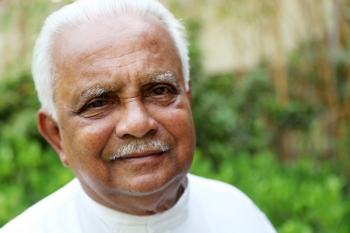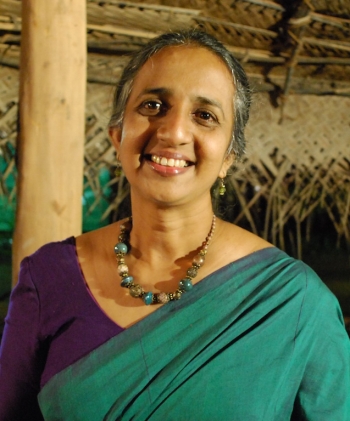 Dr. Ahangamage Tudor Ariyaratne. From moonshineink.com
Dr. Ahangamage Tudor Ariyaratne. From moonshineink.com Dr. Charika Marasinghe. From genevapeaceconference.com
Dr. Charika Marasinghe. From genevapeaceconference.comDr. Ahangamage Tudor Ariyaratne embodies patient but unwavering activism in a frail body of 83 years. The instant I shook his wrinkled hand at his residence, I felt I was with someone who could truly be said to possess moral greatness. The founder of the Sarvodaya Shramadana Movement (shramadana means “gift of labor” in Hindi) has endured physical threats, government snooping, and a lifetime of self-sacrifice to establish one of the first social justice movements in Sri Lanka.
Active since 1958, Sarvodaya not only addresses modern concerns but is also informed explicitly by traditional Theravada Buddhist principles. It is difficult to cover comprehensively Sarvodaya’s vast scope of charitable activities, although it began as a movement to teach Sri Lankans to meditate and support rural communities in building wells, medical centers, and other critical infrastructure, in order to improve their well-being in the rapidly modernizing country. The organization estimates that its current reach extends to 15,000 villages and attracts nearly 1 million volunteers annually. It is easily one of the world’s largest volunteer development movements, and also has around 3,000 paid employees.
Dr. Charika Marasinghe enjoys a unique privilege as Dr. Ariyaratne’s daughter. Like her father, she is a radiant, composed personality, emanating a gentle fearlessness. A small part of this could perhaps be attributed to her father’s influence, but her moral authority is hers alone and not
borrowed. Her work has upturned many of Sri Lanka’s conservative social sensibilities: meditation programs for underage victims of rape, pregnancy counseling, and integrated health care drawn from both native Sri Lankan medicine and modern practice.
“I’m not afraid to suffer,” says Charika, “and I’ve rarely felt particularly vulnerable.” The only period in which she admits to feeling so was during her transition from childhood to the adult world—“That was the time when I felt like I didn’t have the tools to excel and succeed at what I wanted to do, be it in Sri Lanka or when I studied law at Oxford.” Other than that period, she has been unwavering in implementing the non-profit causes she felt her country needed most according to Sarvodaya theory: education, shared responsibility, and spiritual inspiration.
Charika is a freelance consultant for child rights and institutional development, and the manager of Sarvodaya’s Vishva Niketan Peace Centre—in a volunteer capacity. “My father really wanted me to be a full-time worker for Sarvodaya [she would have received a salary if she had agreed], but I really couldn’t do it. Asking for money from parents after they have nurtured you was unthinkable for me, so I will be a lifetime volunteer.” She asserts that she never wanted to do company law or tax law—she wanted to be a human rights lawyer. She feels that her calling has always been to apply law not as a trade or industry like corporate law, but as a tool to address social injustice. In a way, she retains something of that old-fashioned respect for ethics and morality in the professional world, bygone words that have lost meaning in a cut-throat era of self-interest and exploitation.
Her ideal professional is what she eloquently calls a social architect—“What we need is a new generation of social architects who can really change the destiny of countries. The whole world is hurtling towards a very egocentric and tribal way of thinking. Buddhism in Sri Lanka has taken a sometimes nationalistic stance, alienating those of other ethnicities or religions.”
Charika’s comment on Buddhism seems to reflect institutional problems with Sri Lanka’s majority religion. The Theravada-dominated country is blessed with a truly sincere form of Buddhist belief—the Kandy Tooth Temple, which is a medieval monument of incredible beauty, is one of the best examples of genuine piety. Yet the recent civil war that was cast as one fought between Tamil and Sinhalese, Muslim and Buddhist, has left scars deep in the fault lines of Sri Lankan demographics. With the monastic sangha assuming a powerful presence in parliament, complete with its own party, it is not surprising that being Buddhist becomes conflated with being Sinhalese and Sri Lankan.
The country recently voted in a new government under a new president, Maithripala Sirisena. Both Charika and her father have been conspicuously absent from the daily noise of political debate. “We are not interested in ousting or electing governments,” she insists. “All we want is a government that cares for the well-being of its people, irrespective of its political affiliation.” Dr. Ariyaratne has been targeted for intimidation and harassment over the years, and even in tamer contexts there are critics like Susantha Goonatilake, a former president of the Sri Lanka Association for the Advancement of Science. Goonatilake scorned him for having no consistent philosophy, claiming that Dr. Ariyaratne’s thinking changes depending on the donor, while other detractors complain that he took credit for the shramadana movement, maintaining that he did not invent but merely helped to spread it.
No one can claim moral perfection (and Dr. Ariyaratne would be the first to admit this), and it is true that shramadana predates Sarvodaya. It should also be acknowledged that Sarvodaya draws inspiration from Gandhi as much as Buddhism. However, I think Susantha Goonatilake’s condemnation is unfair hyperbole. When I met with Charika at the peace center, she took out a booklet full of diagrams and lists, very clearly outlining how the Four Noble Truths and Noble Eightfold Path could be applied to rural self-governance, educating the young, ministering to couples, and so much more. She considers ignorance to be the root cause of material suffering, and that ignorance can be defeated only through education in self-reliance.
“The Buddhist philosophy of interdependence and interconnectedness teaches that you cannot separate one thing from another,” she says. Bribery and corruption, for example, occur at many institutional levels in Sri Lanka, and there is no single remedy. “I think the world needs Buddhism to be an engaged kind of religion—there are many incentives now for people to be egoistic and self-centered. No profession works in isolation; we all affect others. Ethics has disappeared in many disciplines, so nowadays the best professionals might not always equate to the best people.”
Charika closes by musing on what the Buddha’s message might be if he were alive today. She repeats her wish for young social architects who can revive the appeal of moral authority to wider society. Perhaps her love for ethics is not so old-fashioned after all—at the end of the day, it is the only pillar that can support a future in which all people flourish with a clean conscience.
For more information, see:
















